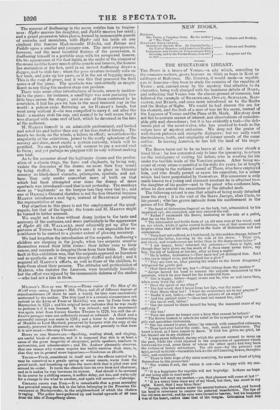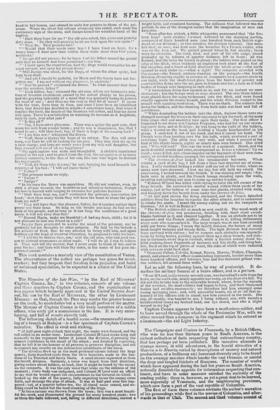NEW BOOKS.
The Bravo, a Venetian Story. By the Author I • 3Vols. Colburn and Bentley.
of " The Pilot."
MILITARY ADVENTURES,
Memoirs of the late War. By CaptainCooke, I Colburn and Bentley.
the Earl of Munster, and Lieutenant Moodie I•" " • Campaigns and Cruises in Venezuela and New ) Grenada, and in the Pacific Ocean, from 1817 ik
to Longman and Co. 1830
THE SPECTATOR'S LIBRARY.
THE Bravo is a bravo of' Venice,—a city which, according to the romance-writers, grows bravoes as thick as hops in Kent or cabbages at Battersea. Mr. COOPER, it would seem—a republi- can in America—has been to study the remains of the republic of Venice • and, carried away by the mystery that attaches to its character, being well charged with the luminous details of DARU, and reflecting that Venice was the classic ground of romance. has followed the example of SHAKSPEARE, OTWAY, SCHILLER, RAD- CLIFFE, and BYRON, and once more introduced us to the Rialto and the Bridge of Sighs. We would he had chosen the sea for his element, and the deck of a man of war for his scene, instead of the Lagunes of Venice and the Place of St. Mark. His story does not fail to contain scenes of interest, and observations of consider- able pith and shrewdness ; but it is too evidently a task—the deli- berate plot of the novel-writer, who has resolved to trade in the vulgar love of mystery and crime. We deny not the praise of well-drawn pictures and energetic dialogues; but we sadly want the freshness, truth, and originality of former novels of the same author. In leaving America, he has left the land of his inspi- ration.
The Bravo turns out to be no bravo at all : he never struck a hired blow : he has consented only to bear the ignominy, in return • for the indulgence of visiting his father, who is wasting his life under the terrible leads of the Venetian prison. After being ac- cused of every crime committed in the state for years, he at length .• • falls a victim to the ruthless Council of Three, who have employed him, and who finally permit or cause his execution, for a crime which had been perpetrated by themselves. His innocence is only made known to a young and innocent creature he is attached to— the daughter of his gaoler—and to the priest who confesses him, when he dies amidst the execrations of the deluded mob.
The following extract is one that admits of being easily detached from the story : it is the visit of the Bravo Jacopo, alias Carlo, to his parent ; who has grown imbecile from the confinement in the prison of the Doge. "The hand of Gelsomina lingered on the lock, but, admonished by his impatient eye, she complied, and they entered the cell.
" Father l' exclaimed the Bravo, hastening to the side of a pallet, that lay on the floor. "The attenuated and feeble form of an old man rose at the word; and an eye which, while it spoke mental feebleness, was at that moment even brighter than that of his son, glared on the faces of Gelsomina and her companion. " Thou hast not suffered, as I had feared, by this sudden change, father l'
continued the latter, kneeling by • the side of the straw. Thine eye, and cheek, and countenance are better than in the damp caves below!' " I am happy, here,' returned the prisoner;—' there is light, and though they have given me too much of it, thou canst never know, my boy, the joy of looking at the day, after so long a night.'
" He is better, Gelsomina I—They have not yet destroyed him. See —his eye is bright even, and his cheek has a glow!' " ` They are ever so, after passing the winter in the lower dungeons;' whispered the i,entle girl. " Hast thou news tor me, boy ?—What tidings from thy mother ?' "Jacopo bowed his head to conceal the anguish occasioned by this question, which he now heard for the hundredth time. " She is happy, father—happy as one can be, who so well loves thee, when away from thy side.'
"'Does she speak of me often?' " The last word, that I heard from her lips, was thy name.' " Holy Maria bless her ! I trust she remembers me in her prayers?' " 'Doubt it not, father,—they are the prayers of an angel !' " 'And thy patient sister ?—thou bast not named her, son.' " She too is well, fattier.' " Has she ceased to blame herself for being the innocent cause of my suffering 1' " She has.' " ' Then she pines no longer over a blow that cannot be helped.' "The Bravo seemed to search for relief in the sympathizing eye of the pale and speechless Gelsomina. "'She has ceased to pine, father,' he uttered, with compelled calmness. "'Thou hast ever loved thy sister, boy, with manly tenderness. Thy heart is kind, as I have reason to know. If God has given me grief, he has blessed me in my children ' "Along pause followed, during which the parent seemed to muse on the past, while the child rejoiced in the suspension of questions which harrowed his soul, since those of whom the other spoke had long been the victims of family misfortune. The old man—for the prisoner was aged, as well as feeble—turned his look on the still kneeling Bravo, thought. fully, and continued. "
'There is little hope of thy sister marrying, for none are fond of tying themselves to the proscribed.'
"'She wishes it not, she wishes it not—she is happy with my mo- ther!'
" It is a happiness the republic will not begrudge. Is there no hope of our being able to meet soon ?' " Thou will meet my mother,—yes, that pleasure will come at last !' It is a weary time since any of my blood, but thee, has stood in my sight. Kneel, that I may bless thee.' Jacopo, who had arisen under his mental torture,. obeyed, and bowed his head in reverence to receive the paternal benediction.. 'The lips of the old man moved, and his eyes were turned to heaven, but his language was of the heart, rather than that of the tongee. Gelsomina bent heP
head to her bosom, and seemed to unite her prayers to those of the pri- soner. When the silent but solemn ceremony was ended, each made the customary sign of the cross, and Jacopo kissed the wrinkled hand of the captive. " Hast thou hope for me ? ' the old man asked, this pious and grateful duty done. Do they still promise to let me look upon the sun again ?' " They do. They promise fair.' "'Would that their words were true ! I have lived on hope, for a weary time—I have now been within these walls more than four years, methinks.'
" Jacopo did not answer, for he knew that his father named the period only that he himself had been permitted to see him.
" I built upon the expectation, that the Doge would remember his an- cient servant, and open my prison-doors.'
" Still Jacopo was silent, for the Doge, of whom the other spoke, had long been dead. " And yet I should be grateful, for Maria and the Saints have not for- gotten me. I am not without my pleasures, in captivity.' " God be praised !' exclaimed the Bravo. ' In what manner dost thou ease thy sorrows, father ?'
" Look hither, boy,' returned the old man, whose eye betrayed a mix- ture of feverish excitement, caused by the recent change in his prison, and the growing imbecility of a mind that was gradually losing its powers for want of use ; dost thou see the rent in that bit of wood ? It opens with the heat, from time to time, and since I have been an Inhabitant here, that fissure has doubled in length—I sometimes fancy, that when it reaches the knot, the hearts of the Senators will soften, and that my doors will open. There is a satisfaction in watching its increase as it lengthens, inch by inch, year after year l' " Is this all ?'
" Nay, I have other pleasures. There was a spider the past year, that wove his web from yonder beam ; and he was a companion, too, that I loved to see ; wilt thou look, boy, if there is hope of his coaling back ?' " I see him not ;' whispered the Bravo.
" Well, there is always the hope of its return. The flies will enter soon, and then he will be looking for his prey. They may shut me up on a false charge, and keep me weary years from my wife and daughter, but they cannot rob me of all my happiness !'
"The aged captive was mute and thoughtful. A childish impatience glowed in his eye ; and he gazed from the rent, the companion of so many solitary summers, to the face of his son, like one who began to distrust his enjoyments.
" Well, let them take it.away,' he said, burying his head beneath the covering of his bed ; I will not curse them !'
" Father!'
" The prisoner made no reply. " Father I' " Jacopo !' "In his turn the Bravo was speechless. He did not venture, even, to steal a glance towards the breathless and attentive Gelsomina, though his bosom heaved with longing to examine her guileless features. " Dost thou hear me, son?' continued the prisoner, uncovering his bead ; ' dost thou really think they will have the heart to chase the spider from my cell ?'
" They will leave thee this pleasure, father, for it touches neither their power nor their fame. So long as the Senate can keep its foot on the neck of the people, and so long as it can keep the seemliness of a good name, it will not envy thee this.'
"'Blessed Maria, make me thankful 1—I had my fears, child ; for it is not pleasant to lose any friend in a cell!'
"Jacopo then proceeded to soothe the mind of the prisoner, and he gradually led his thoughts to other subjects. He laid by the bedside a few articles of food, that he was allowed to bring with him, and again holding out the hope of eventual liberation, he proposed to take his leave. " I will try to believe thee, son,' said the old man, who had good rea- son to distrust assurances so often made. I will do all I can to believe it. Thou wilt tell thy mother, that I never cease to think of her, and to pray for her ; and thou wilt bless thy sister, in the name of her poor im- prisoned parent.'"
This work contains a masterly view of the constitution of Venice. The observations of the author are perhaps too grave for novel- readers ; but they bespeak that freedom from prejudice, and habit of unbiassed speculation, to be expected in a citizen of the United States,



























 Previous page
Previous page